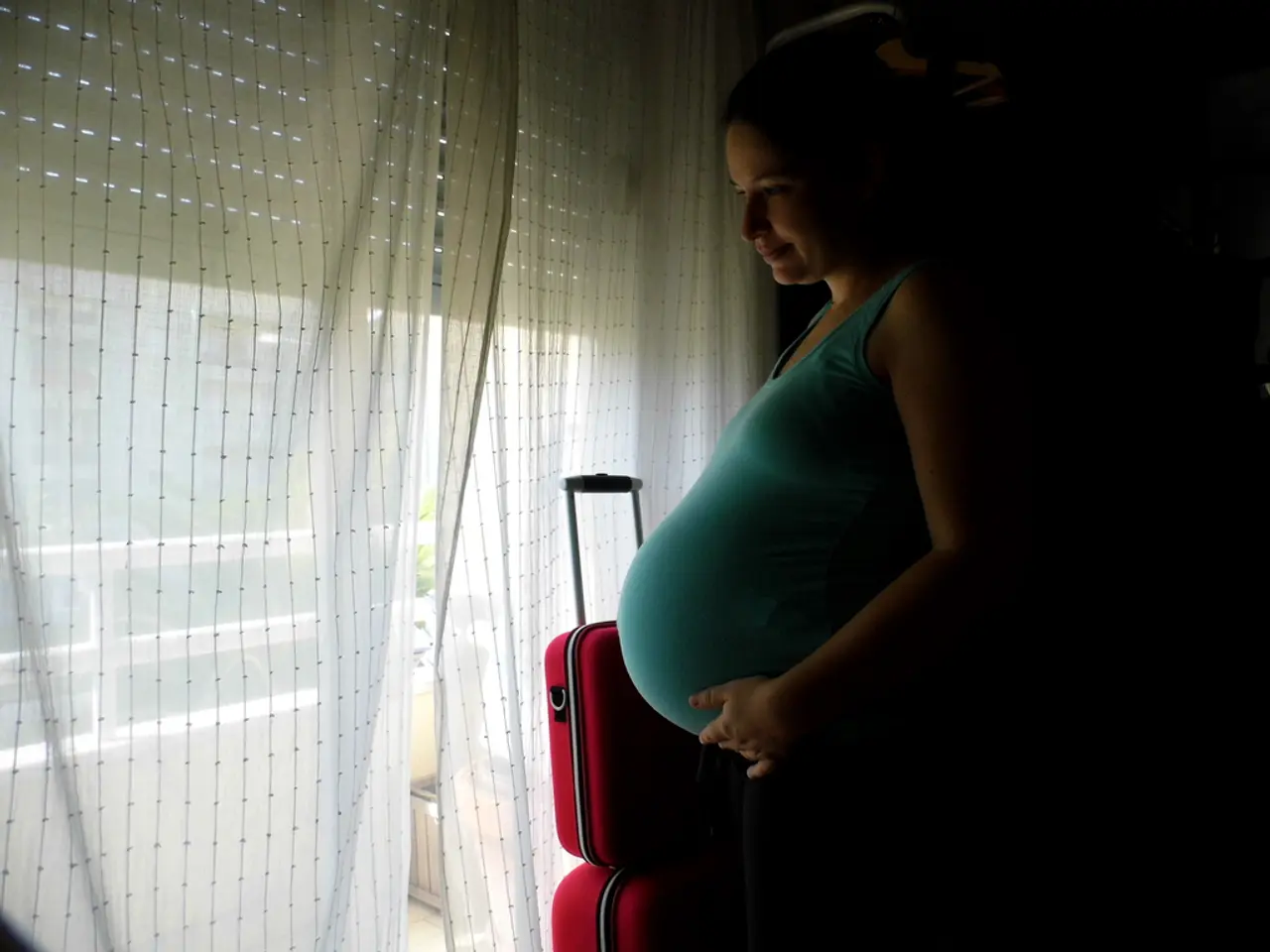Pregnancy and sexual desire: Exploring shifts in sexual urges
Pregnancy can bring about a myriad of physical, emotional, and hormonal changes that may impact a woman's sexual desire and activity. While each individual's experience varies, understanding the factors influencing these changes can help expectant mothers navigate this aspect of their lives during pregnancy.
In the first trimester, hormonal shifts, nausea, fatigue, and physical discomfort often lead to a decrease in sexual desire. Many women experience bloating, exhaustion, and morning sickness that reduce libido and interest in sex [1][5]. As the pregnancy progresses into the second trimester, energy levels improve, morning sickness subsides, and hormonal changes may enhance blood flow to pelvic regions, increasing sexual desire for some women [1][2][3]. However, the third trimester typically sees a decline in libido due to physical discomfort from the growing belly, fatigue, and concerns about the pregnancy's progress [1][3].
Factors contributing to these changes include hormonal fluctuations, physical symptoms, emotional and psychological factors, relationship dynamics, and medical advice or complications. Estrogen and progesterone levels affect mood and libido, while nausea, fatigue, and body changes can diminish desire. Anxiety about miscarriage, body image concerns, and stress are common influencers, and emotional closeness and communication with a partner play a significant role in sexual intimacy during pregnancy [5]. In some pregnancies, doctors may advise abstaining from sex due to risks like premature labor [1].
It is essential to maintain good hygiene during sexual activity. Anal sex, if chosen, should be followed by careful cleaning of the penis or sex toy before switching to vaginal sex to prevent harmful bacteria from entering the vagina. Oral sex is generally safe during pregnancy, but the woman's partner should avoid blowing into her vagina to prevent the risk of embolisms [6].
Unless an obstetrician or midwife advises otherwise, anal sex, vaginal sex, and masturbation are safe during pregnancy. However, women should consult their healthcare professional if they have any concerns about specific sexual activities. Pregnant women and their partners can safely participate in most forms of sex as long as it is consensual, comfortable, and safe.
Masturbation is also safe during pregnancy, unless advised otherwise by a healthcare professional, and can help relieve tension and stress. Women should not masturbate if their obstetrician advises them to limit orgasms due to pregnancy complications or concerns about preterm labor.
In conclusion, while sex during pregnancy is generally safe for most women unless contraindicated by medical advice, sexual desire fluctuates mainly due to physical, hormonal, and emotional changes across trimesters [1][2][3][5]. It is crucial for pregnant women to communicate openly with their partners and healthcare professionals about their concerns and experiences to ensure a comfortable and safe sexual relationship throughout pregnancy.
References: [1] American Pregnancy Association. (n.d.). Sex During Pregnancy. Retrieved from https://americanpregnancy.org/pregnancy-complications/sex-during-pregnancy/ [2] Mayo Clinic Staff. (2020, November 13). Sexual activity during pregnancy. Retrieved from https://www.mayoclinic.org/healthy-lifestyle/pregnancy-week-by-week/expert-answers/sexual-activity-during-pregnancy/faq-20068502 [3] NHS. (2020, May 11). Sex in pregnancy. Retrieved from https://www.nhs.uk/pregnancy/lifestyle/sex-and-pregnancy/ [4] Planned Parenthood. (2020, November 12). Sex During Pregnancy. Retrieved from https://www.plannedparenthood.org/learn/pregnancy/prenatal-care/sex-during-pregnancy [5] The Bump. (2020, October 13). Sex During Pregnancy: What You Need to Know. Retrieved from https://www.thebump.com/a/sex-during-pregnancy-what-you-need-to-know
- Pregnancy may lead to changes in a woman's sexual desire due to factors such as hormonal fluctuations, physical symptoms, emotional and psychological factors, and relationship dynamics.
- In the first trimester, hormonal shifts, nausea, fatigue, and physical discomfort often decrease sexual desire, while the second trimester may see an increase due to improved energy levels and enhanced blood flow.
- The third trimester typically sees a decline in libido due to physical discomfort, fatigue, and concerns about the pregnancy's progress.
- Good hygiene is essential during sexual activity, and oral sex is generally safe during pregnancy, but the woman's partner should avoid blowing into her vagina to prevent the risk of embolisms.
- Anal sex, if chosen, should be followed by careful cleaning to prevent harmful bacteria from entering the vagina.
- Masturbation can help relieve tension and stress during pregnancy but should be avoided if advised by a healthcare professional due to pregnancy complications or concerns about preterm labor.
- Women should consult their healthcare professional if they have any concerns about specific sexual activities during pregnancy.
- Pregnant women and their partners can safely participate in most forms of sex as long as it is consensual, comfortable, and safe.
- Understanding the factors influencing changes in sexual desire during pregnancy can help expectant mothers navigate this aspect of their lives.
- Communication with partners and healthcare professionals is crucial to ensure a comfortable and safe sexual relationship throughout pregnancy, as it is generally safe for most women unless contraindicated by medical advice.




